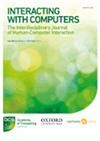Designing and Evaluating Aventura Marina: A Serious Game to Promote Visitors' Engagement in a Science Museum Exhibition
IF 1
4区 计算机科学
Q3 COMPUTER SCIENCE, CYBERNETICS
引用次数: 1
Abstract
Museums have employed video games in their exhibitions to foster visitors’ participation and improve their learning process through a positive experience. In this work, we present Aventura Marina, a serious video game inspired by escape room game mechanics, composed of an app and an authoring tool, which aims to promote visitors’ engagement with the new exhibition Sea Hall of the Caracol Museo de Ciencias, a Mexican museum in the northwest of Mexico. To design Aventura Marina, we followed a user-centered design approach, based on the design thinking methodology. We evaluated the high-fidelity prototype of the game and the low-fidelity prototype of the authoring tool with museum staff and potential visitors. Our results indicate that Aventura Marina has the potential to promote visitors’ engagement with the Sea Hall exhibition as participants indicated having a positive experience, recognized that they were more interested in and less bored by the topics of the exhibition and that they were eager to play the game again. In relation to the authoring tool, museum staff mentioned how this project could be implemented in other halls of the museum. Finally, we discuss the improvements for a future iteration of the prototypes and how this kind of technology can complement the content of museum exhibitions.设计和评估Aventura Marina:一个严肃的游戏,以促进游客参与科学博物馆展览
博物馆在展览中使用电子游戏,以促进参观者的参与,并通过积极的体验改善他们的学习过程。在这个作品中,我们展示了Aventura Marina,这是一个严肃的电子游戏,灵感来自密室逃脱游戏机制,由一个应用程序和一个创作工具组成,旨在促进游客参与墨西哥西北部的Caracol Museo de Ciencias博物馆的新展览海洋大厅。为了设计Aventura Marina,我们遵循了以用户为中心的设计方法,基于设计思维方法。我们与博物馆工作人员和潜在访客一起评估了游戏的高保真原型和创作工具的低保真原型。我们的研究结果表明,Aventura Marina有潜力促进游客对海洋大厅展览的参与,因为参与者表示有积极的体验,认识到他们对展览主题更感兴趣,不那么无聊,并且他们渴望再次玩这个游戏。关于创作工具,博物馆工作人员提到了如何在博物馆的其他大厅实施这个项目。最后,我们讨论了未来原型迭代的改进,以及这种技术如何补充博物馆展览的内容。
本文章由计算机程序翻译,如有差异,请以英文原文为准。
求助全文
约1分钟内获得全文
求助全文
来源期刊

Interacting with Computers
工程技术-计算机:控制论
CiteScore
2.70
自引率
0.00%
发文量
12
审稿时长
>12 weeks
期刊介绍:
Interacting with Computers: The Interdisciplinary Journal of Human-Computer Interaction, is an official publication of BCS, The Chartered Institute for IT and the Interaction Specialist Group .
Interacting with Computers (IwC) was launched in 1987 by interaction to provide access to the results of research in the field of Human-Computer Interaction (HCI) - an increasingly crucial discipline within the Computer, Information, and Design Sciences. Now one of the most highly rated journals in the field, IwC has a strong and growing Impact Factor, and a high ranking and excellent indices (h-index, SNIP, SJR).
 求助内容:
求助内容: 应助结果提醒方式:
应助结果提醒方式:


